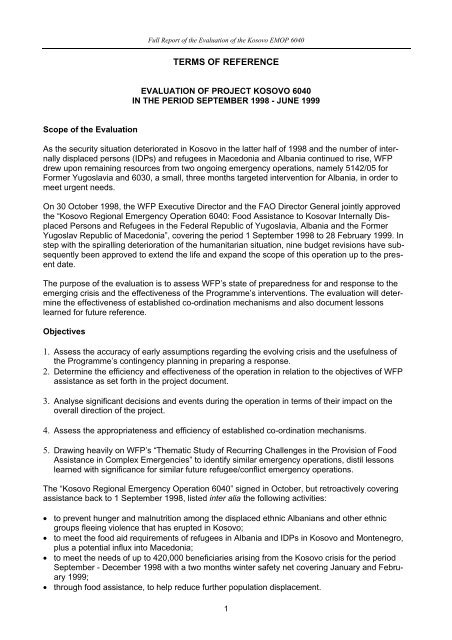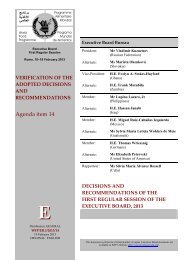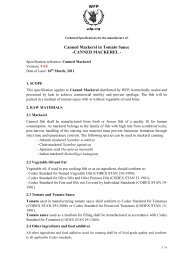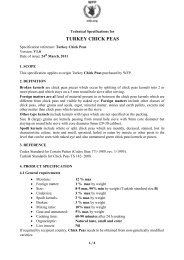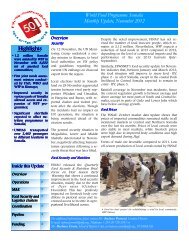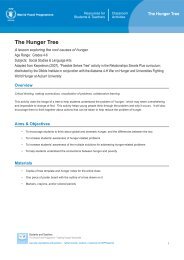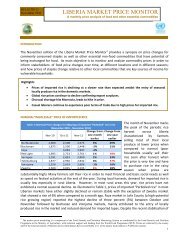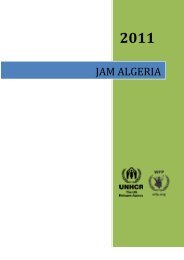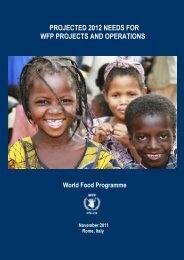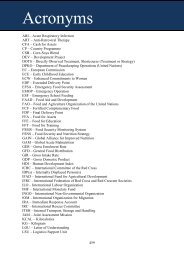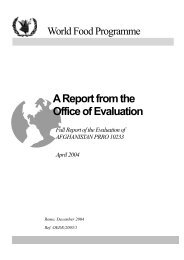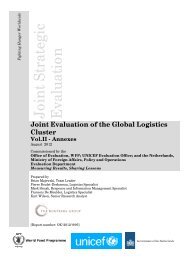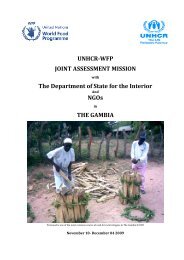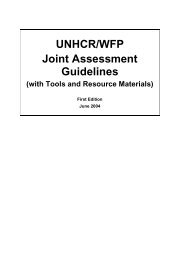Full Report - WFP Remote Access Secure Services
Full Report - WFP Remote Access Secure Services
Full Report - WFP Remote Access Secure Services
You also want an ePaper? Increase the reach of your titles
YUMPU automatically turns print PDFs into web optimized ePapers that Google loves.
Scope of the Evaluation<br />
<strong>Full</strong> <strong>Report</strong> of the Evaluation of the Kosovo EMOP 6040<br />
TERMS OF REFERENCE<br />
EVALUATION OF PROJECT KOSOVO 6040<br />
IN THE PERIOD SEPTEMBER 1998 - JUNE 1999<br />
As the security situation deteriorated in Kosovo in the latter half of 1998 and the number of internally<br />
displaced persons (IDPs) and refugees in Macedonia and Albania continued to rise, <strong>WFP</strong><br />
drew upon remaining resources from two ongoing emergency operations, namely 5142/05 for<br />
Former Yugoslavia and 6030, a small, three months targeted intervention for Albania, in order to<br />
meet urgent needs.<br />
On 30 October 1998, the <strong>WFP</strong> Executive Director and the FAO Director General jointly approved<br />
the “Kosovo Regional Emergency Operation 6040: Food Assistance to Kosovar Internally Displaced<br />
Persons and Refugees in the Federal Republic of Yugoslavia, Albania and the Former<br />
Yugoslav Republic of Macedonia”, covering the period 1 September 1998 to 28 February 1999. In<br />
step with the spiralling deterioration of the humanitarian situation, nine budget revisions have subsequently<br />
been approved to extend the life and expand the scope of this operation up to the present<br />
date.<br />
The purpose of the evaluation is to assess <strong>WFP</strong>’s state of preparedness for and response to the<br />
emerging crisis and the effectiveness of the Programme’s interventions. The evaluation will determine<br />
the effectiveness of established co-ordination mechanisms and also document lessons<br />
learned for future reference.<br />
Objectives<br />
1. Assess the accuracy of early assumptions regarding the evolving crisis and the usefulness of<br />
the Programme’s contingency planning in preparing a response.<br />
2. Determine the efficiency and effectiveness of the operation in relation to the objectives of <strong>WFP</strong><br />
assistance as set forth in the project document.<br />
3. Analyse significant decisions and events during the operation in terms of their impact on the<br />
overall direction of the project.<br />
4. Assess the appropriateness and efficiency of established co-ordination mechanisms.<br />
5. Drawing heavily on <strong>WFP</strong>’s “Thematic Study of Recurring Challenges in the Provision of Food<br />
Assistance in Complex Emergencies” to identify similar emergency operations, distil lessons<br />
learned with significance for similar future refugee/conflict emergency operations.<br />
The “Kosovo Regional Emergency Operation 6040” signed in October, but retroactively covering<br />
assistance back to 1 September 1998, listed inter alia the following activities:<br />
• to prevent hunger and malnutrition among the displaced ethnic Albanians and other ethnic<br />
groups fleeing violence that has erupted in Kosovo;<br />
• to meet the food aid requirements of refugees in Albania and IDPs in Kosovo and Montenegro,<br />
plus a potential influx into Macedonia;<br />
• to meet the needs of up to 420,000 beneficiaries arising from the Kosovo crisis for the period<br />
September - December 1998 with a two months winter safety net covering January and February<br />
1999;<br />
• through food assistance, to help reduce further population displacement.<br />
1


